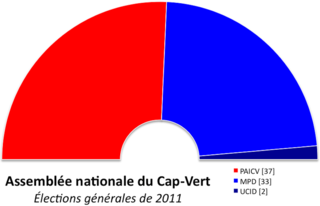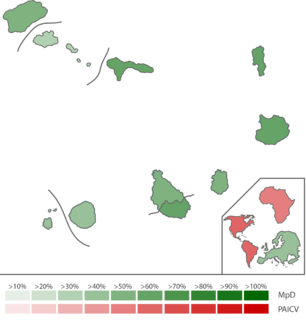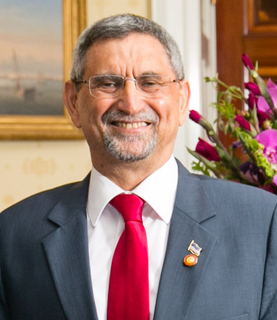
Politics of Cape Verde takes place in a framework of a semi-presidential representative democratic republic, whereby the Prime Minister of Cape Verde is the head of government and the President of the Republic of Cape Verde is the head of state, and of a multi-party system. Executive power is exercised by the President and the Government. Legislative power is vested in both the Government and the National Assembly. The Judiciary is independent of the executive and the legislature. The constitution first approved in 1980 and substantially revised in 1992 forms the basis of government organization. It declares that the government is the "organ that defines, leads, and executes the general internal and external policy of the country" and is responsible to the National Assembly.

José Maria Pereira Neves is a Cape Verdean politician who was Prime Minister of Cape Verde from 2001 to 2016. He is a member of the African Party for the Independence of Cape Verde (PAICV).

The African Party of Independence of Cape Verde is a former socialist party and currently a social-democratic political party in Cape Verde. Its members are nicknamed "os tambarinas" in Portuguese, and they identify themselves with the color yellow.
The Democratic Convergence Party was a centrist political party in Cape Verde.
The Democratic and Independent Cape Verdean Union is a conservative political party in Cape Verde.
The Labour and Solidarity Party is a political party in São Vicente, Cape Verde led by Gilson Alves.

The unicameral National Assembly is the legislative body of the Republic of Cape Verde.
The Social Democratic Party is a political party in Cape Verde.

Parliamentary elections were held in Cape Verde on 22 January 2006. The result was a victory for the ruling African Party for the Independence of Cape Verde (PAICV) run by José Maria Neves, which won 41 of the 72 seats in the National Assembly. Second was the Movement for Democracy (Mpd) and third was Democratic and Independent Cape Verdean Union (UCID) led by João Santos dos Luís.

Parliamentary elections were held in Cape Verde on 14 January 2001. The result was a victory for the African Party for the Independence of Cape Verde run by José Maria Neves, which won 40 of the 72 seats in the National Assembly, defeating the ruling Movement for Democracy led by Carlos Veiga. Third was the Democratic Alliance for Change (ADM) led by José dos Santos Luís with 6.12% of the votes.

Parliamentary elections were held Cape Verde on 6 February 2011. The result was a victory for the ruling African Party for the Independence of Cape Verde (PAICV), led by Prime Minister Jose Maria Neves, which won 38 of the 72 seats in the National Assembly.

General elections were held in Guinea-Bissau on 3 July 1994, with a second round for the presidential election on 7 August. They were the first multi-party elections since independence, and also the first time the president had been directly elected, as previously the post had been elected by the National People's Assembly. In the presidential election, the result was a victory for incumbent João Bernardo Vieira of the African Party for the Independence of Guinea and Cape Verde (PAIGC), who defeated Kumba Ialá of Social Renewal Party in the second round. In the Assembly election, 1,136 candidates ran for the 100 seats, of which the PAIGC won 62.

General elections were held in Guinea-Bissau on 28 November 1999, with a second round for the presidential election on 16 January 2000. The presidential election resulted in a victory for opposition leader Kumba Ialá of the Party for Social Renewal (PRS), who defeated Malam Bacai Sanhá of the ruling African Party for the Independence of Guinea and Cape Verde. The PRS were also victorious in the National People's Assembly election, winning 38 of the 102 seats.

Parliamentary elections were held in Cape Verde on 7 December 1985. The country was a one-party state at the time, with the African Party for the Independence of Cape Verde (PAICV) as the sole legal party. The PAICV presented a list of 83 candidates to voters to approve. The list was approved by 94.0% of voters, with a turnout of 68.9%.

Parliamentary elections were held in Cape Verde on 13 January 1991, the country's first multi-party elections, having previously been a one-party state with the African Party for the Independence of Cape Verde (PAICV) as the sole legal party. The number of seats was reduced from 83 to 79. The result was a victory for the Movement for Democracy, which won 56 of the 79 seats. Voter turnout was 75.3%.

Presidential elections were held for the first time in Cape Verde on 17 February 1991, as previously the National Assembly had elected the President. The result was a victory for António Mascarenhas Monteiro of the Movement for Democracy, which had also won the parliamentary elections the previous month. He defeated incumbent Aristides Pereira of the African Party for the Independence of Cape Verde. Voter turnout was 61.4%.

Parliamentary elections were held in Portugal on 12 November 1961. The ruling National Union won all 130 seats unopposed.

Parliamentary elections were held in Cape Verde on 20 March 2016. The ruling African Party for the Independence of Cape Verde (PAICV), led by Janira Hopffer Almada, was defeated by the Movement for Democracy (MpD), led by Ulisses Correia e Silva.

Presidential elections were held in Cape Verde on 2 October 2016. Incumbent President Jorge Carlos Fonseca of the Movement for Democracy (MpD) was re-elected with 74.08% of the vote.


















